-
Policy, regulatory issues hobble hydropower as wind-power backup
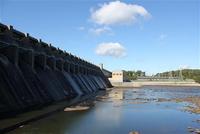
Theoretically, hydropower can step in when wind turbines go still, but barriers to this non-polluting resource serving as a backup are largely policy- and regulation-based, according to researchers.
-
-
Methane, ethane, and propane found in water wells near shale gas sites
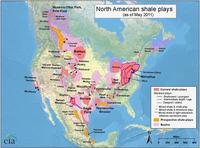
Homeowners living within one kilometer of shale gas wells appear to be at higher risk of having their drinking water contaminated by stray gases, according to a new study. Scientists analyzed 141 drinking water samples from private water wells across northeastern Pennsylvania’s gas-rich Marcellus shale basin. Their study documented not only higher methane concentrations in drinking water within a kilometer of shale gas drilling — which past studies have shown — but higher ethane and propane concentrations as well.
-
-
Discoveries in nanotechnology to make clean, fresh drinking water more plentiful
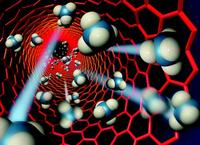
The University of Chicago and Ben-Gurion University of the Negev will begin funding a series of ambitious research collaborations that apply the latest discoveries in nanotechnology to create new materials and processes for making clean, fresh drinking water more plentiful and less expensive by 2020.
-
-
Planned Calif. building demolition to provide information about nearby fault
When California State University, East Bay (CSUEB) demolishes its seismically unsafe Warren Hall this summer on its Hayward campus, the landmark building’s implosion will produce energy similar to a small earthquake which can be used to study and map the nearby Hayward Fault. In cooperation with the university, the U.S. Geological Survey will observe and record the mid-August implosion on hundreds of seismographs temporarily set out in a roughly one-mile radius from Warren Hall.
-
-
Registration opens for NIST Cybersecurity Framework Workshop
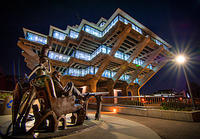
Executive Order 13636, Improving Critical Infrastructure Cybersecurity, gave NIST the responsibility to work with industry to develop a voluntary “framework” — incorporating existing standards, guidelines, and best practices — that institutions could use to reduce the risk of cyber attacks. The National Institute of Standards and Technology (NIST) has opened registration for its Third Cybersecurity Framework Workshop, to be held 10-12 July 2013, in San Diego, California.
-
-
NASA seeks ideas on locating and exploring asteroids – and redirecting them away from Earth

NASA also released a request for information (RFI) that invites industry and potential partners to offer ideas on accomplishing NASA’s goal to locate, redirect, and explore an asteroid, as well as find and plan for asteroid threats. The RFI is part of a broader NASA program focusing on finding all asteroid threats to human populations and knowing what to do about them.
-
-
New microfluidic chip useful in counterterrorism, water and food safety
A new process for making a three-dimensional microstructure that can be used in the analysis of cells could prove useful in counterterrorism measures and in water and food safety concerns. Researchers developed a new microfabrication technique to develop three-dimensional microfluidic devices in polymers. Microfluidics deals with the performance, control, and treatment of fluids that are constrained in some fashion.
-
-
An environmentally friendly battery made from wood
Taking inspiration from trees, scientists have developed a battery made from a sliver of wood coated with tin that shows promise for becoming a tiny, long-lasting, efficient and environmentally friendly energy source. Their report on the device — 1,000 times thinner than a sheet of paper — appears in the journal Nano Letters.
-
-
Shale oil and shale gas resources globally abundant: report
Estimated shale oil and shale gas resources in the United States and in 137 shale formations in forty-one other countries represent 10 percent of the world’s crude oil and 32 percent of the world’s natural gas technically recoverable resources, or those that can be produced using current technology. A new report estimates technically recoverable 345 billion barrels of world shale oil and 7,299 trillion cubic feet of world shale gas.
-
-
Testing the seismic strength of light frame steel construction
A partnership of leading earthquake engineering researchers from top U.S. and Canadian universities and design professionals from the steel industry have begun the final phase of a three-year project to increase the seismic safety of buildings that use lightweight cold-formed steel for their primary beams and columns. Research to conclude with shake-table testing.
-
-
Newark to raise water rates to pay for infrastructure
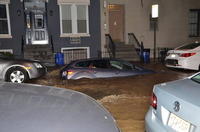
A report presented to Newark’s city council said that the town’s water and sewer rates will be increased by more than 60 percent over the next ten years in order to pay for $500 million in infrastructure repairs to the town’s faulty and outdated meters, century-old, leaky pipes, and broken valves.
-
-
Natural gas from fracking, coal have similar energy return on investment (EROI)
The value of a fuel’s long-term usefulness and viability is judged through its energy return on investment, that is, the comparison between the eventual fuel and the energy invested to create it. A new study finds that shale gas has a return value which is close to coal.
-
-
Risk assessment of shale gas fracking to biodiversity
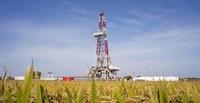
Fracking, the controversial method of mining shale gas, is widespread across Pennsylvania, covering up to 280,000 km² of the Appalachian Basin. New research explores the risks posed to biodiversity including pollution from toxic chemicals, the building of well pads and pipelines, and changes to wetlands.
-
-
Texas to appeal FEMA decision not to declare West, Texas a disaster area
The Federal Emergency Management Agency (FEMA) said President Obama would not declare West, Texas a disaster area in the wake of the massive fertilizer plant explosion there two months ago, and Texas governor Rick Perry is not happy. FEMA said Texas did not make the case the state lacked funds for cleanup and recovery efforts.
-
-
New Jersey faces costly water infrastructure upgrades
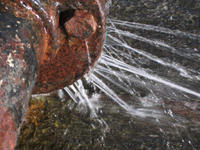
Before Hurricane Sandy hit New Jersey, state officials knew they had much work ahead of them to update the state’s water infrastructure. The damage Sandy inflicted only highlighted the inadequacies of New Jersey’s outdated wastewater, stormwater, and drinking water infrastructure. Upgrading the system will be costly, but not doing so will be costlier.
-
More headlines
The long view
Water Wars: A Historic Agreement Between Mexico and US Is Ramping Up Border Tension
As climate change drives rising temperatures and changes in rainfall, Mexico and the US are in the middle of a conflict over water, putting an additional strain on their relationship. Partly due to constant droughts, Mexico has struggled to maintain its water deliveries for much of the last 25 years, deliveries to which it is obligated by a 1944 water-sharing agreement between the two countries.
Trump Is Fast-Tracking New Coal Mines — Even When They Don’t Make Economic Sense
In Appalachian Tennessee, mines shut down and couldn’t pay their debts. Now a new one is opening under the guise of an “energy emergency.”
Smaller Nuclear Reactors Spark Renewed Interest in a Once-Shunned Energy Source
In the past two years, half the states have taken action to promote nuclear power, from creating nuclear task forces to integrating nuclear into long-term energy plans.
Keeping the Lights on with Nuclear Waste: Radiochemistry Transforms Nuclear Waste into Strategic Materials
How UNLV radiochemistry is pioneering the future of energy in the Southwest by salvaging strategic materials from nuclear dumps –and making it safe.
Model Predicts Long-Term Effects of Nuclear Waste on Underground Disposal Systems
The simulations matched results from an underground lab experiment in Switzerland, suggesting modeling could be used to validate the safety of nuclear disposal sites.
